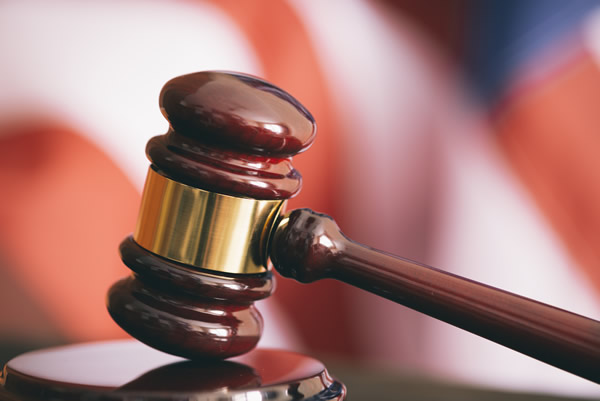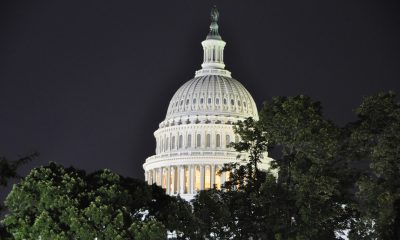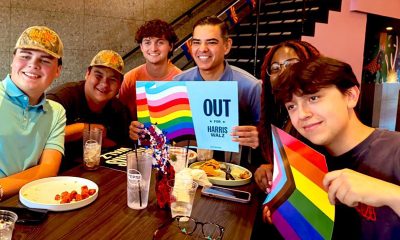National
4th Circuit tosses challenge to N.C. anti-gay marriage law
Measure allows magistrates to opt out of performing ceremonies


The Fourth Circuit has thrown out a challenge to an anti-gay marriage law.
The U.S. Fourth Circuit Court of Appeals tossed out on Wednesday a lawsuit challenging a state law allowing state magistrates to opt out of performing same-sex marriages for religious reasons, citing a lack of standing by plaintiffs in the litigation.
Writing for the three-judge panel, U.S. Circuit Judge James Harvie Wilkinson III determined plaintiffs in the lawsuit — couples who assert the law amounts to spending public funds in the aid of religion — have no standing to press a claim against Senate Bill 2.
“Plaintiffs concede that the state has not impeded or restricted their opportunity to get married,” Wilkinson said. “One same-sex couple married in 2014, another same-sex couple is engaged to be married, and the last pair of plaintiffs, an interracial couple, married in 1976. Nonetheless, they contend that their status as North Carolina taxpayers affords them standing to challenge SB2. Because plaintiffs’ claim does not fall within the narrow exception to the general bar against taxpayer standing, their suit must be dismissed.”
Joining Wilkinson, a Reagan appointee, in the 18-page decision was U.S. Circuit Judge Barbara Keenan, an Obama appointee, and U.S. Circuit Judge Stephanie Thacker, another Obama appointee.
The couples — aided by the Campaign for Southern Equality and the Charlotte-based law firm Tin Fulton Walker & Owen, sued North Carolina in December 2016 on the basis the law violates the Establishment Clause under the First Amendment and rights to due process and equal protection under the 14th Amendment.
But U.S. District Judge Max Coburn in September ruled the couples lacked any claim to standing under both of those arguments in challenging the law, throwing out the case. Although the plaintiff sought an appeal of the dismissal based on the Establishment Clause claims, the 4th Circuit issued a ruling upholding the lower court decision throwing out the case.
Luke Largess, a partner at Tin Fulton Walker & Owen and lead counsel the case, said his team his reviewing the decision and has not made a decision about the next action in the case.
“We are reviewing the court’s opinion published this morning and will make a decision about whether to pursue any further appeals, either to the full 4th Circuit or to the Supreme Court,” Largess said.
The plaintiffs in the case consist of Kay Diane Ansley and Catherine McGaughey, a same-sex couple who married in October as a result of courts overturning North Carolina’s ban on same-sex marriage; Carol Ann Person and Thomas Roger Person, an interracial different-sex couple denied a wedding in 1976, but able to obtain one in 1978 after winning a lawsuit; and Kelley Penn and Sonja Goodman, a same-sex couple in Swain County and who were engage to marry.
Rev. Jasmine Beach-Ferrara, executive director of the Campaign for Southern Equality, maintained SB2 is discrimination regardless of the 4th Circuit decision.
“SB2 is unjust and distorts the true meaning of religious freedom,” Beach-Ferrara said. “From day one, it’s been clear that SB2 is about one thing – finding a new way to discriminate against same-sex couples and privileging one set of religious beliefs over others. We will keep standing up to discrimination until LGBTQ North Carolinians are equal in every sphere of life.”
The law allows a magistrate in North Carolina to opt out of performing same-sex marriages. However, a magistrate who obtains an exemption can perform no marriages whatsoever for a six-month period. At the end of that period, magistrates can renew their request for an exemption that would last another six months.
SB2 requires at least one magistrate who can perform marriages to be present within a county office at least 10 hours per week, over at least three business days per week.
According to the North Carolina Administrative Office of the Courts, the state has 31 magistrates who currently aren’t performing marriages.
The North Carolina Legislature approved SB2 two years ago amid a series of court rulings in favor of marriage equality. Ironically, former Gov. Pat McCrory, who became infamous for signing anti-LGBT House Bill 2, vetoed the measure on the basis it defied court rulings for marriage equality. The legislature overrode his veto shortly afterward.
Among the friends-of-the-court supporting the state in litigation were the North Carolina Values Coalition, the Thomas More Law Center, the Christian Legal Society and the National Association of Evangelicals.
Tami Fitzgerald, executive director of the North Carolina Values Coalition, applauded the 4th Circuit decision in a statement as win for religious freedom.
“The NC Values Coalition applauds the 4th Circuit’s ruling upholding North Carolina’s magistrate recusal law, which simply recognizes that every citizen, even government employees, has the right to exercise their religious beliefs about marriage,” Fitzgerald said. “The court rightly held that taxpayers have not been harmed by the law, and that the law accommodates the rights of magistrates and registers of deeds to exercise conscientious objection to same-sex marriages by recusing themselves, while also insuring that same-sex couples have the ability to get married.”
National
National resources for trans and gender diverse communities
Amid attacks, help is available from wide range of organizations

The Trump administration has launched a series of executive orders and other initiatives restricting the rights of the transgender community since taking power in January, targeting military service, affirming healthcare, and participation in sports.
Though many executive orders are being challenged in court, it’s an uncertain time for a community that feels threatened. Despite the uncertainty, there are resources out there to help.
From legal assistance to mental health support, here’s a list of nonprofits and organizations dedicated to improving the everyday livelihood of trans and gender diverse people. These are mostly national organizations; there are many additional groups that work in local communities across the country. Some of these national groups will connect those in need of help to a local organization.
LEGAL HELP
President Trump issued an executive order declaring there are only two genders –– male and female –– which applies to legal documents and passports. The order doesn’t recognize the idea that one can transition their gender at birth to another gender.
Ash Lazarus Orr filed to renew his passport with a gender marker reflecting his identity. That was in January, and he still hasn’t received it. He refused to accept a passport without an accurate identification of who he is, so he filed a lawsuit with the ACLU in what is now known as Orr v. Trump.
Orr told the Washington Blade that not receiving his passport back has taken away his freedom of visiting family in Canada and receiving gender-affirming care from a trusted provider in Ireland.
The one thing getting him through this uncertain time is knowing who he’s fighting for –– the trans community, his loved ones, and himself.
“I’m trying to be that person that those younger parts of me needed growing up,” Orr said. Check out a couple of legal support organizations below:
Transgender Law Center
The Transgender Law Center (TLC) provides legal resources and assistance. TLC has a list –– called the Attorney Solidarity Network –– of attorneys that can provide advice or representation for trans people.
The organization also has a legal information help desk that answers questions regarding laws or policies impacting trans people.
Website: transgenderlawcenter.org
Phone: 510-587-9696
Email: info@transgenderlawcenter.org
Advocates For Trans Equality
With a variety of different programs tailored toward legal assistance and advocacy work, Advocates For Trans Equality’s reach is wide.
The non-profit offers the Name Change Project, which provides pro bono legal name change services to low-income trans, gender-non-conforming and nonbinary people by utilizing its partnerships with law firms and corporate law departments.
Advocates For Trans Equality also has departments and programs dedicated to increasing voter engagement, educating lawmakers on trans issues and offering litigation assistance to a small number of cases.
Website: transequality.org
Phone: 202-642-4542
General email: a4te@transequality.org
To contact a specific department or program, visit its website above.
ADVOCACY
Looking to take action and get involved? Act now.
American Civil Liberties Union
The ACLU is a national nonprofit organization that mobilizes local communities and advocates for national causes.
Getting involved is as easy as filling out letters to representatives or signing petitions. One live petition is to “defend trans freedom.”
You can also join its People Power platform, where you serve as a volunteer in your community to “advance civil liberties and civil rights for all.” ACLU has different chapters across the country, so visit its website for more information.
Website: aclu.org
Phone: 212-549-2500
MILITARY AND VETERANS
Trump signed an executive order in January banning transgender service members from serving, stating their identity “conflicts with a soldier’s commitment to an honorable, truthful and disciplined lifestyle, even in one’s personal life.”
Though the order has been legally challenged and struck down by a judge, U.S. Navy Lieutenant Rae Timberlake said it’s created an uncertain atmosphere for themself and other troops.
“All of the transgender service members I know have served with honor and integrity for many years…[and we’re] targeted for removal and not subject to any kind of review based on merit,” Timberlake, who joined the Navy at age 17, said. “There’s kind of just this cloud looming over our organizations and our units, because we know any day our transgender shipmates could no longer be on the team.”
But Timberlake’s message to any service member struggling because of the executive order was one of compassion and truth: “There’s no policy that can take away what you’ve accomplished and what you’ve done.”
Here are some organizations that support service members and veterans:
SPARTA Pride
SPARTA is a peer-support group composed of active duty, veteran and “future warrior” service members.
The group also engages in advocacy work and has helped change policies on gender neutral uniforms and reducing the time a trans service member would have to wait to return to their duties during their transition.
Contact SPARTA to learn more about joining its support network.
Website: spartapride.org
Email: inquiries@spartapride.org
Modern Military Association
Modern Military supports service members and veterans through advocacy, legal assistance and mental health support.
It tracks LGBTQ+ and HIV discrimination through reports made on its website, and offers guidance and advice to whoever submitted the report.
It also supports the mental health of LGBTQ+ veterans and their families through its Resilient Heroes Program. By signing up, you’ll receive virtual peer support and case management services with a mental health coordinator.
Website: modernmilitary.org
Phone: 202-328-3244
Email: info@modernmilitary.org
CRISIS & MENTAL HEALTH SUPPORT
If you have a more urgent matter, or just need someone to listen, here are some organizations you can reach out to:
The Trevor Project
The Trevor Project offers 24/7 counseling services. Calling, texting or chatting is free and confidential, and you’ll get to speak with someone specialized in supporting LGBTQ youth.
The organization also focuses on public education by hosting online LGBTQ suicide prevention trainings. It advocates for policies and laws that contribute to supporting queer youth.
Website: thetrevorproject.org
Crisis hotline: 1-866-488-7386
General inquiry phone number: 212-695-8650
Trans Lifeline
Trans Lifeline is a hotline run and operated by trans people. Whether you’re questioning if you’re trans or are a trans person just wanting to talk, someone will be there to help. It’s free and confidential, and there won’t be any non-consensual active rescue, such as calling the emergency services.
The line is not 24/7, however. Check out its website for hours within your time zone.
Website: translifeline.org
Phone: 877-565-8860
Here are other organizations that offer support to the trans community:
TransFamilies (support): Support for families with a gender diverse child.
TransLatina Coalition (advocacy): Advocates for the specific needs of the transgender, gender expansive and intersex communities in the U.S.
TransAthlete (information): Provides informative resources about trans athletes.
Campaign for Southern Equality’s Trans Youth Emergency Project (healthcare support): A fund to help trans youth access lifesaving healthcare.
TransTech Social (economic empowerment): Dedicated to discovering and empowering the career-ready skills of LGBTQ+ people.
World Professional Association For Transgender Health (health): Resources, symposiums and research dedicated to improving transgender health.
Sylvia Rivera Law Project (legal): Legal programs and services for marginalized communities.
Gender Spectrum (support): Resources and support groups for trans youth and families.
The Okra Project (support): Creates and supports initiatives that provide resources for the Black Trans community.
The White House
White House does not ‘respond’ to reporters’ requests with pronouns included
Government workers were ordered not to self-identify their gender in emails

White House Press Secretary Karoline Leavitt and a senior advisor in the Department of Government Efficiency rejected requests from reporters who included their pronouns in the signature box of their emails, each telling different reporters at the New York Times that “as a matter of policy,” the Trump-Vance administration will decline to engage with members of the press on these grounds.
News of the correspondence between the journalists and the two senior officials was reported Tuesday by the Times, which also specified that when reached for comment, the White House declined to “directly say if their responses to the journalists represented a new formal policy of the White House press office, or when the practice had started.”
“Any reporter who chooses to put their preferred pronouns in their bio clearly does not care about biological reality or truth and therefore cannot be trusted to write an honest story,” Leavitt told the Times.
Department of Government Efficiency Senior Advisor Katie Miller responded, “I don’t respond to people who use pronouns in their signatures as it shows they ignore scientific realities and therefore ignore facts.”
Steven Cheung, the White House communications director, wrote in an email to the paper: “If The New York Times spent the same amount of time actually reporting the truth as they do being obsessed with pronouns, maybe they would be a half-decent publication.”
A reporter from Crooked media who got an email similar to those received by the Times reporters said, “I find it baffling that they care more about pronouns than giving journalists accurate information, but here we are.”
The practice of adding pronouns to asocial media bios or the signature box of outgoing emails has been a major sticking point for President Donald Trump’s second administration since Inauguration Day.
On day one, the White House issued an executive order stipulating that the federal government recognizes gender as a binary that is immutably linked to one’s birth sex, a definition excludes the existence of intersex and transgender individuals, notwithstanding the biological realities that natal sex characteristics do not always cleave neatly into male or female, nor do they always align with one’s gender identity .
On these grounds, the president issued another order that included a directive to the entire federal government workforce through the Office of Personnel Management: No pronouns in their emails.
As it became more commonplace in recent years to see emails with “she/her” or “he/him” next to the sender’s name, title, and organization, conservatives politicians and media figures often decried the trend as an effort to shoehorn woke ideas about gender (ideas they believe to be unscientific), or a workplace accommodation made only for the benefit of transgender people, or virtue-signaling on behalf of the LGBTQ left.
There are, however, any number of alternative explanations for why the practice caught on. For example, a cisgender woman may have a gender neutral name like Jordan and want to include “she/her” to avoid confusion.
A spokesman for the Times said: “Evading tough questions certainly runs counter to transparent engagement with free and independent press reporting. But refusing to answer a straightforward request to explain the administration’s policies because of the formatting of an email signature is both a concerning and baffling choice, especially from the highest press office in the U.S. government.”
U.S. Military/Pentagon
Air Force rescinds rule barring inclusion of preferred pronouns in email signatures
Conflict with language in military funding package may explain reversal

The U.S. Air Force has issued a “directive to cease the use of ‘preferred pronouns’ (he/him, she/her, or they/them) to identify one’s gender identity in professional communications,” according to a report published in the Hill on Wednesday.
The rule, which applies to both airmen and civilian employees, was first adopted on Feb. 4 pursuant to President Donald Trump’s anti-transgender executive order called, “Defending Women from Gender Ideology Extremism and Restoring Biological Truth to the Federal Government.”
Days after the administration’s issuance of that order on the first day of the president’s second term, the Office of Personnel Management instructed agencies across the whole of the federal government to remove pronouns from email signatures and enforce the policy barring employees from using them.
Additionally, on Jan. 27 Trump published an order barring trans people from joining the U.S. Armed Forces, indicating that those who are currently in serving would be separated from the military. The Pentagon is fending off legal challenges to the ban in federal courts.
Particularly given the extent of the new administration’s efforts to restrict the rights of trans Americans and push them out of public life, the Air Force’s reversal of the pronoun guidance was surprising.
According to reporting in Military.com, the move might have come because officials concluded the rule was in conflict with language in the military appropriations funding legislation passed by Congress in 2023.
The NDAA established that the defense secretary “may not require or prohibit a member of the armed forces or a civilian employee of the Department of Defense to identify the gender or personal pronouns of such member or employee in any official correspondence of the Department.”
-

 District of Columbia5 days ago
District of Columbia5 days agoWorldPride organizers may warn trans people from abroad not to attend event
-

 Opinions4 days ago
Opinions4 days agoIt’s time for new leadership on the Maryland LGBTQIA+ Commission
-

 The White House4 days ago
The White House4 days agoWhite House does not ‘respond’ to reporters’ requests with pronouns included
-

 Noticias en Español4 days ago
Noticias en Español4 days agoINDIGNACIÓN: ¡El transfeminicidio de Sara Millerey en Colombia nos cuestiona como sociedad!












